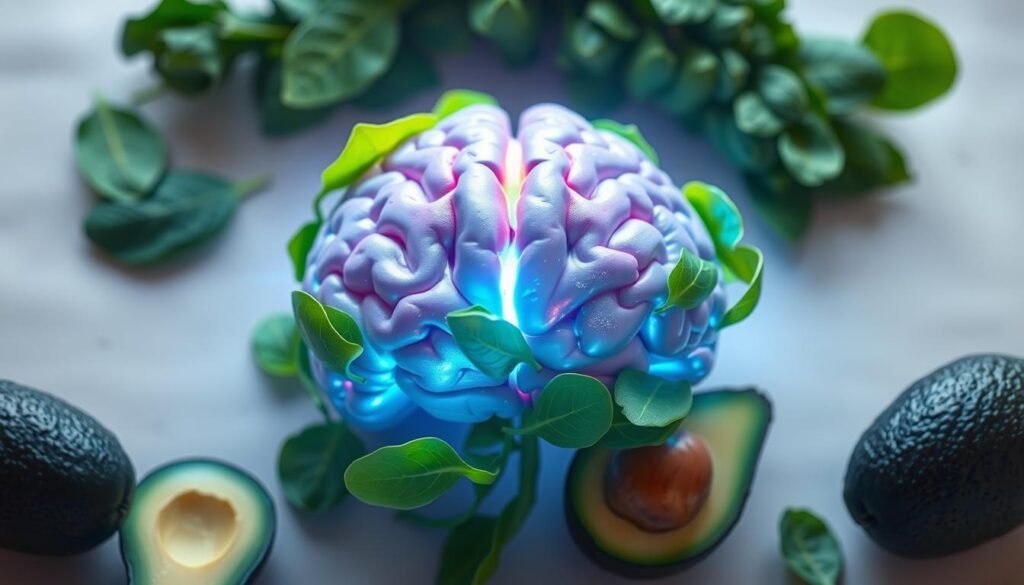About 31% of adults in the U.S. have anxiety at some point. This shows how crucial it is to find effective anxiety management strategies. One key strategy is understanding the role of B vitamins in mental health. These vitamins are vital for emotional stability and can affect anxiety levels. Having low levels of B vitamins can worsen anxiety symptoms. It’s important to explore B Vitamins and Anxiety for better mental well-being.
Each B vitamin plays a distinct role in creating mood balance. This impacts our thoughts and feelings. By looking closer at these vitamins, we can see their benefits for easing anxiety. It highlights how important good nutrition is for our mental health.
Key Takeaways
- B vitamins are essential for emotional well-being and can help reduce anxiety symptoms.
- Deficiencies in these vitamins may contribute to the severity of anxiety disorders.
- Nutrition plays a crucial role in mental health, specifically in managing mood.
- Each B vitamin has unique benefits that impact neurotransmitter function.
- Understanding the relationship between B vitamins and anxiety can improve overall mental health.
Understanding Anxiety Disorders
Anxiety disorders are a major type of mental health issues worldwide. They include different specific disorders like generalized anxiety disorder (GAD), panic disorder, and social anxiety disorder. They have common features but also unique symptoms of anxiety that affect daily life.
Many adults will face anxiety at some time. Knowing who it affects can help create good coping strategies. These conditions often involve:
- Excessive worry and fear
- Restlessness or feeling on edge
- Physical signs such as faster heart rate and sweating
- Hard time focusing or blanking out
Anxiety disorders don’t just affect the person. They also impact work, relationships, and mental health. Learning about symptoms of anxiety helps people get the right support. Knowing these conditions can be managed is a big step towards better living.
The Role of Nutrition in Mental Health
Research shows that nutrition plays a key role in mental health. What we eat affects how we feel emotionally. A balanced diet helps keep moods steady and boosts brain function.
Diet and anxiety are closely linked. B Vitamins, for example, are crucial for mood regulation. They help with energy and brain chemical production, which stabilizes emotions.
Eating a variety of nutrient-rich foods improves mental health. Diets missing important vitamins and minerals can lead to more anxiety and mood problems. Focusing on a diet full of essential nutrients is key to better mental wellbeing.
B Vitamins and Anxiety: Key Nutrients for Relief
B vitamins are crucial for emotional health. The vitamin B complex plays unique roles in well-being. They are really important when we talk about B Vitamins and Anxiety. These nutrients support body functions tied to mood regulation.
Defining B Vitamins
The B vitamin group has eight essential vitamins. These vitamins have big roles in health. Here they are:
- Thiamine (B1)
- Riboflavin (B2)
- Niacin (B3)
- Pyridoxine (B6)
- Folate (B9)
- Cobalamin (B12)
- Biotin
- Pantothenic Acid
These vitamins help our body work right, like making energy. This is key for clear thinking and staying emotionally balanced. Not having enough of these vitamins can make anxiety worse and upset our moods.
How B Vitamins Impact Neurotransmitter Function
B vitamins help make important brain chemicals. These include serotonin, dopamine, and norepinephrine. They are key for keeping our moods stable. Getting enough B vitamins helps our body to make these chemicals. This might help to lessen anxiety symptoms.
Studies show that getting enough B vitamins makes us emotionally stronger. They help make neurotransmitters, which controls stress and boosts emotional health. Making sure we have these vitamins, from food or supplements, can help tackle anxiety and improve mental health.
Thiamine (B1) and Its Effects on Anxiety
Thiamine is also called vitamin B1. It helps our bodies make energy and keeps our nerves working right. Not having enough thiamine can cause problems that make anxiety worse. Knowing what signs to look for and eating foods high in B1 can help us stay mentally healthy.
Symptoms of B1 Deficiency
Not having enough B1 can show up in many ways, including:
- Irritability: You might feel more stressed and emotionally out of balance.
- Fatigue: Feeling tired all the time can make anxiety stronger.
- Cognitive disturbances: Having trouble with memory, focusing, and thinking clearly.
These issues can all make anxiety feelings stronger. It’s important to keep an eye on how much B1 you get in your diet.
Food Sources Rich in Thiamine
Eating foods full of B1 can lower the chance of not having enough. Some of the best foods for B1 are:
| Food Source | Thiamine Content (mg per 100g) |
|---|---|
| Whole grains | 0.76 |
| Legumes (beans, lentils) | 0.61 |
| Nuts and seeds | 0.17 |
| Pork | 0.87 |
| Fortified cereals | 0.50 |
Having a diet with these foods can help keep your thiamine levels right. This may help ease anxiety symptoms.

The Importance of Riboflavin (B2) for Emotional Balance
Riboflavin, also known as B2, is key for turning food into energy. This process impacts our mood and mental health. When we don’t get enough riboflavin, we might feel more anxious or moody.
Studies show not getting enough riboflavin can lead to mood issues. This makes eating foods high in riboflavin crucial for mood support. Foods rich in riboflavin include:
- Dairy products like milk and yogurt
- Eggs
- Green leafy vegetables such as spinach and kale
- Nuts and seeds
- Fortified cereals
Eating these foods often helps keep our emotions in check. For better mental health, riboflavin should be a diet staple. Learn more about how riboflavin and mood are connected at Moodcare Health.
| Riboflavin Sources | Riboflavin Content (mg per 100g) |
|---|---|
| Milk | 1.1 |
| Eggs | 0.5 |
| Spinach | 0.2 |
| Almonds | 1.1 |
| Fortified Cereals | 0.5-6.0 |
Exploring Niacin (B3) and Stress Management
Niacin, also known as vitamin B3, is important for mental health. It helps make energy and neurotransmitters. This is key for handling stress and easing anxiety. Knowing how niacin aids mental health shows how it helps people with anxiety disorders.
Niacin’s Role in Energy Production
Niacin turns food into energy, which is crucial for our bodies. It makes coenzymes needed for metabolism, like:
- NAD (Nicotinamide adenine dinucleotide)
- NADP (Nicotinamide adenine dinucleotide phosphate)
These coenzymes are needed for cells to breathe and create energy. More energy means better thinking and mood, which helps with stress.
Benefits of Niacin for Anxiety Relief
Niacin does more than just make energy. Studies show it helps balance mood chemicals like serotonin. This can lessen anxiety by:
- Boosting serotonin, which may lower anxiety symptoms.
- Helping control emotions and stress reactions better.
- Making stressful situations less overwhelming by calming the nervous system.
Adding niacin to your diet, through foods or supplements, might improve mental health. Its dual role in energy and mood regulation makes it a good support for stress management.

| Sources of Niacin | Niacin Content (mg per 100g) |
|---|---|
| Chicken breast | 13.4 |
| Turkey | 10.4 |
| Salmon | 8.5 |
| Tuna | 11.7 |
| Brown rice | 4.4 |
| Peanuts | 12.1 |
Pyridoxine (B6): A Crucial Player in Mood Regulation
Pyridoxine, or B6, is key for mood regulation and mental health. It helps make neurotransmitters like serotonin, which stabilizes our emotions. Enough pyridoxine means better mood and less anxiety.
Studies show people with anxiety often lack B6. Eating foods rich in this vitamin helps manage anxiety. You can find pyridoxine in:
- Fish
- Poultry
- Bananas
- Potatoes
- Chickpeas
Adding these foods to your diet boosts wellbeing. It’s a natural way to regulate mood. With more pyridoxine, your emotional health could greatly improve.
The Significance of Folate (B9) in Reducing Anxiety Symptoms
Folate, known as B9, is crucial for our brain’s health. It greatly affects our feelings and mood. Studies link low folate levels with more anxiety and mental health issues. Getting enough folate can help ease anxiety and improve mental stability.
Folate and Brain Health
Folate’s link to brain health is key to its effect on anxiety. It helps make neurotransmitters which control our mood. Not having enough folate can reduce serotonin and dopamine, increasing anxiety.
Eating foods high in folate is important for keeping folate levels up. Here are some top folate foods:
- Dark leafy greens (spinach, kale, collard greens)
- Legumes (beans, lentils, chickpeas)
- Fortified grains (cereals, bread)
- Fruits (oranges, bananas, avocados)
- Nuts and seeds (sunflower seeds, peanuts)

| Folate-Rich Food | Approximate Folate Content (mcg per 100g) |
|---|---|
| Spinach | 194 |
| Lentils | 181 |
| Fortified Cereal | 400 |
| Asparagus | 149 |
| Avocado | 81 |
Cobalamin (B12) and Mental Clarity
Cobalamin, also known as vitamin B12, is key to good neurological function and mental clarity. It helps make red blood cells and DNA, which are crucial for cognitive health. A brain with the right amount of cobalamin will work well and avoid cognitive decline.
Studies show that not having enough cobalamin might lead to anxiety. People with low levels of this vitamin could have mood swings. Eating the right foods or taking supplements can improve mental health. Cobalamin is found in meat, fish, poultry, and dairy, so some people, like vegetarians, need to watch their intake.
Getting enough cobalamin boosts energy, which can make someone feel happier and less anxious. While a supplement may help those lacking this vitamin, it’s important to know how B vitamins affect mental health. Before starting vitamins, talking to a doctor is wise because cobalamin can interact with some medications.
| Food Source | Amount of Cobalamin (B12) per Serving |
|---|---|
| Beef (3 oz) | 4.4 mcg |
| Salmon (3 oz) | 4.9 mcg |
| Chicken (3 oz) | 0.3 mcg |
| Dairy (1 cup milk) | 1.2 mcg |
| Fortified cereal (1 serving) | 6 mcg |
For better mental clarity and anxiety relief, it’s important to ensure you get enough cobalamin. For more information on vitamin B12 and mental health, visit this resource.
Conclusion
The link between B Vitamins and anxiety is clear and shows why nutrition is key to good mental health. This article has shown that B vitamins like thiamine, riboflavin, niacin, pyridoxine, folate, and cobalamin are important. They help control mood and reduce anxiety. By eating a diet rich in these vitamins, people can actively improve their emotional health.
Nutrition is a strong ally against anxiety. Eating foods high in B vitamins can boost brain function and emotional strength. Before making diet changes or starting supplements, speaking with a doctor is important. They can help design a plan that’s right for you, ensuring the changes are helpful and safe.
Knowing how B vitamins affect mental health lets people make smart choices. Adding these vitamins to daily life can support the path to better mental health and a happier life.